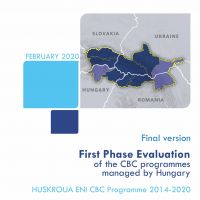Strategic alliance set along the external borders of the EU
Eastern Partnership + Knowledge sharing | 12 February 2020
Eastern Partnership + Knowledge sharing | 12 February 2020
On 10 February, the National University of Uzhhorod (Ukraine) hosted a ceremonial event including a scientific meeting where the representatives of the three partners, the Institute of Economic and Legal Research of the National Academy of Sciences of Ukraine, the Faculty of Law of Uzhhorod National University and the Central European Service for Cross-Border Initiatives (CESCI) signed a cooperation memorandum launching strategic alliance facilitating cross-border cooperation along Ukraine’s western borders.
The first European Grouping of Territorial Cooperation (EGTC) of the EU with a third country member was established in 2015 with the participation of the Council of Szabolcs-Szatmár-Bereg county, the Municipality of Kisvárda (Hungary) and the Council of Transcarpathian Region (Ukraine). The Tisza EGTC was set up based on the relevant EU legislation and the fact that Ukraine was among the first countries adopting the third protocol of the Madrid Outline Convention. However, the national level of legal background guaranteeing the operation of an EGTC in the territory of Ukraine is still missing. In order to help the construction of the necessary legal framework, in 2019, the Tisza EGTC invited the National Academy of Sciences of Ukraine, the Faculty of Law of Uzhhorod National University and CESCI to elaborate a study unfolding the actual legal framework and identifying the steps to be taken at national level in order to adapt the provisions fully legalising the use of the EGTC tool in Ukraine. The study was presented in September 2019 at an international conference in Berehovo (Ukraine).
Based on the results of the joint study, the parties decided to continue on with the cooperation and to follow-up the whole process. In order to enhance their cooperation, the three partners signed a memorandum setting the frames of joint activities in the future. The signing ceremony took place at the Uzhhorod National University, on 10 February with the presence of Mr Andrii Guk, Head of the Council of Europe Office in Ukraine, Mr József Buhajla, General Consul of Hungary to Ukraine and Myroslava Oleksandrivna Lendel, Vice-Rector for Academic Policy and Research of the university. The ceremony was preceded by a scientific meeting titled “Development of cross-border cooperation of Ukraine in the context of European integration: status, challenges, prospects” where the experts of the academic sphere and the managers of the Tisza EGTC outlined the potential role of cross-border cooperation from the perspective of Ukraine’s Euro-Atlantic integration.
The contracted parties defined the fields of their joint activities covering three geographic level (the territory of the Tisza EGTC, the Eastern Partnership and the Visegrad Four countries, and the European scene, namely the EU and the Council of Europe), and four thematic fields (scientific research, education, legislation and daily practice of CBC). The matrix representing these two dimensions includes concrete topics where the partners intend to cooperate.
As an immediate result, the participants of the cooperation and the representative of the Council of Europe, decided to elaborate two documents in 2020: a practical guide popularising cross-border cooperation addressing local and regional actors of Ukraine’s western borders; and a legal study containing concrete recommendations on the adoption of legal documents on EGTC, addressing the Government of Ukraine. Besides, in compliance with the Memorandum, the parties identify a coordinator and make proposals on concrete joint projects and activities within the term of 60 days. As the Preamble of the Memorandum articulates it, the parties are committed to „systematic and consistent cooperation between the Parties in the area of promoting cross-border cooperation between Ukraine and the Member States of the European Union and the Council of Europe in economic, social, scientific, cultural and other relations” by which Ukraine can get closer to the European institutions.

 First Phase Evaluation of the Hungary-Slovakia-Romania-Ukraine ENI Cross-Border...
First Phase Evaluation of the Hungary-Slovakia-Romania-Ukraine ENI Cross-Border...